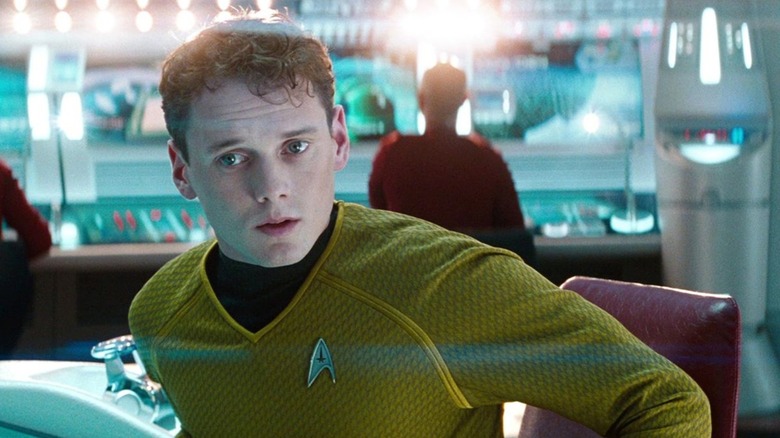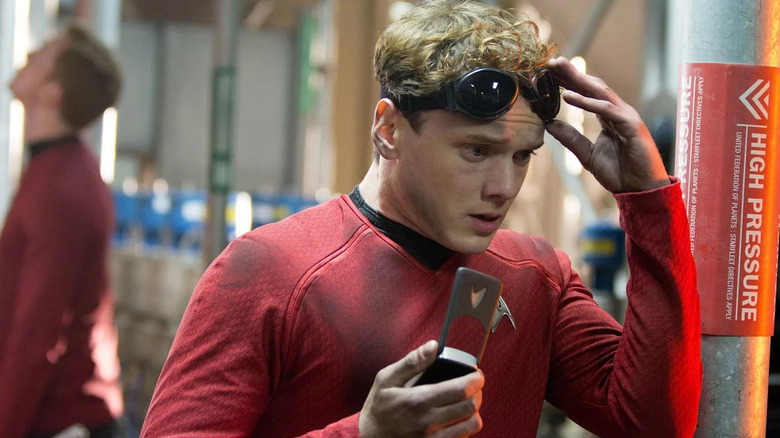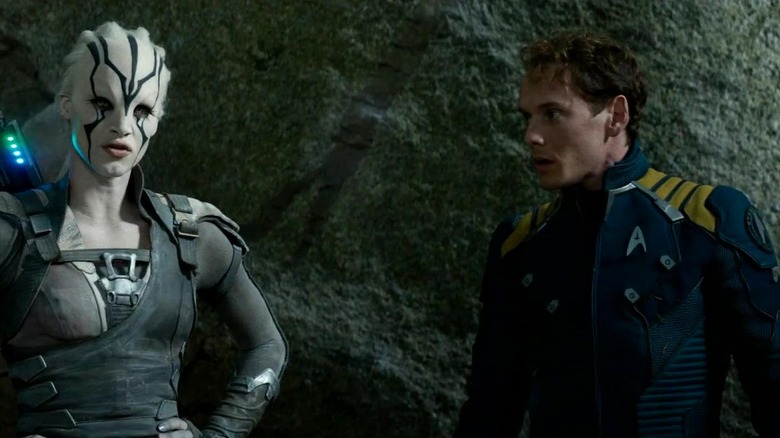Anton Yelchin's Chekov Accent In Star Trek Was Inaccurate On Purpose
Viacom, the parent company of Paramount, underwent a dramatic split in 2005, causing the TV rights to "Star Trek" and the movie rights to "Star Trek" to be divided among two separate companies. This meant that if the movie-owners wanted to make a new feature film, they would have to license "Star Trek" iconography from the TV-owners. Under the conditions of such a liscense, a movie had to look legally distinct from the old TV show. What a headache.
This situation led to the creation of the Kelvin-verse, a "Star Trek" continuity that took place in a parallel timeline. The 2009 "Star Trek" movie featured the same ships and characters as the 1966 "Star Trek," but altered into something similar-yet-different. New actors played younger versions of the 1966 originals, and the U.S.S. Enterprise was now twice as big. Director J.J. Abrams also made the new movie more dramatic, action-packed, and full of explosions. There's some debate among Trekkies as to whether or not the Kelvin-verse is in the spirit of "Star Trek" or if it should be considered an autonomous media entity.
What everyone seemed to agree on, however, was the new film's savvy casting. The newer, younger actors all did exemplary jobs of capturing the looks, mannerisms, and personalities of their 1960s counterparts. They were youthful, more impulsive versions of the characters we knew, but held the same appeal.
The role of Ensign Pavel Chekhov, previously played by Walter Koenig, went to the late Anton Yelchin. Yelchin captured Koenig's cockiness, Russian-centric ego, and dazzling charm. He also recreated Koenig's broad Russian accent, a notable feature of the character.
In 2009, Yelchin spoke with TrekMovie, and he revealed that the accent was deliberately broad; it wasn't supposed to sound authentic. He also explained why he made that decision.
The younger, more capable Chekov
It should also be noted that the main characters from the 2009 "Star Trek" are not just younger and impulsive, but ultra-capable super-geniuses who seem well-equipped to face any problem. In the 1960s, Koenig's Chekov was handy with a retort and certainly a competent officer, but the Yelchin version of the character made him a genius engineer, capable of beaming fellow officer on board the Enterprise even if they're falling at terminal velocity toward the planet below.
Yelchin was born in Leningrad (now St. Petersburg) and his parents moved to the United States when he was still a baby. He grew up around Russian-speaking relatives, and could emulate an accurate Russian accent, should the situation call for it. For Yelchin, though, Chekov wasn't so much an authentic Russian as he was an homage to Walter Koenig. As such, Yelchin emulated his forebear's broad, inaccurate Russian pronunciation, a pronunciation, the actor said, that was common in American acting in the 1960s. Yelchin said:
"I wanted it to be close to the Chekov accent [...]. I have no problem doing a real Russian accent, but that wouldn't be Chekov to me. The interesting thing about it is that his accent is a Cold War stereotype of a Russian person. And when I watched the series and the films, that is what I found interesting about it. And I adjusted it, it is not entirely the same, but Walter came on set and was like 'that sounds like me.' And that is what was fun for me."
A blessing from the man himself. Yelchin must have been filled with pride.
Ёмаё!
Yelchin continued:
"As a person familiar with a Russian accent, and someone with Russian roots who can speak Russian and knows what Russian people sound like, it was fun to purposefully mess around with the Russian accent — to purposefully change what I thought a Russian accent was to suit that stereotype they had in the sixties."
While making press tours for the 2009 "Star Trek" film, Yelchin naturally made a stop in Moscow to address the Russian press. The actor said that Russia loved Chekov despite the inaccuracy of his accent. He explained:
"They love it. There are certain things in the movie that are very Russian that is difficult for an American audience to pick up on. Like when [Kirk and Sulu] free fall and I capture them and I say something in Russian ... 'ёмаё (yomayo!)' ... it means 'Oh man!' basically, which is something I ad-libbed. Which goes back to what I was saying. Chekov never speaks Russian in the series, and that was Russian slang. And that is something I decided to add just for the hell of it because J.J. said 'throw in some Russian, let's do it for fun.'"
So even though the accent wasn't quite right, Yelchin was careful to make the character Russian through-and-through. Like Koenig, Yelchin was also careful to depict a Russian character as kind, charismatic, and personable, skewing away from the Cold War boogeyman characters so often seen in American media. "I think Russian people are very happy with Chekov," Yelchin said, "because he is one of the few Russian characters in American pop culture history that is not the 'Red Dawn' kind of Russians."
Yelchin died in a car accident in 2016 at the age of 27. He is deeply missed.


